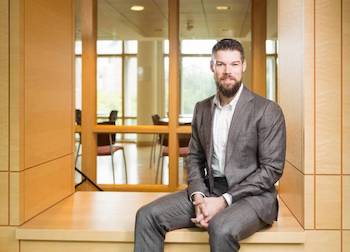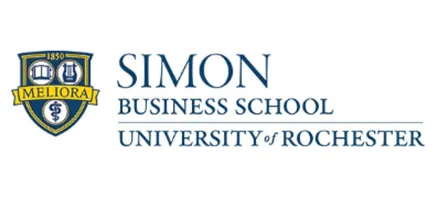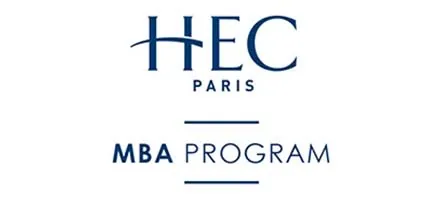
Dartmouth Tuck’s Class of 2022 is comprised of 49% women, a school record. Among them: Forté Foundation fellow Katie McMurray, pictured above, who joins Tuck from Teach for America and Slack. Dartmouth Tuck photo
Business schools across the United States fretted mightily about what the fall of 2020 would look like once their extended application rounds had concluded. How diluted would the talent pool be? Would the best talent wait a year, expecting mostly virtual instruction at the majority of schools in a coronavirus-plagued fall?
If the newly released class profile for the Tuck School of Business at Dartmouth College is any indication, those worries were somewhat misplaced. Not only did Tuck enroll a class of high-achievers from 47 countries (a school record, up from 45 last year), it is reporting an international student population of 37%, down only slightly from 38% in 2019, and an overall enrollment of 289, up from 284. The increase, however small, is notable at a time when Harvard Business School is enrolling a new class that is more than 200 MBA students shy of a typically sized cohort of 930 to 940 due to a policy of granting admitted candidates the choice to defer their start by a year or two.
But the biggest news of all is that Tuck has set a mark all of its elite peers will find tough to match, enrolling 49% women — a school record and 2 percentage points better than any top-25 school last year. Tuck enrolled 42% women in its MBA Class of 2021 last year, well behind Stanford and Wharton’s 47% each and also trailing Michigan Ross (45%) and Harvard, Northwestern Kellogg, and Duke Fuqua (43% each).
INCREASE IN WOMEN PARTLY THE RESULT OF SCHOLARSHIP SUPPORT
Only one top-25 school has ever reached 50% women in its full-time MBA program — USC Marshall School of Business, which enrolled 52% in 2018.
“Some of this has to do, I believe, with the investments we’ve made in scholarship support,” says Luke Anthony Peña, Tuck’s executive director of admissions and financial aid. “Before we invested in more scholarships, we were admitting a number of women who really wanted to be at Tuck but they had financial incentives from some other schools that made enrolling at Tuck unduly burdensome. So we doubled our scholarship budget over the last few years, and that’s greatly reduced some of those barriers.
“I think the other reason is that there’s a lot of energy in our community about the celebration of 50 years of women at Tuck. And so from our students to the alumni to our own admissions team, there’s a lot of enthusiasm right now about creating more opportunities for women in business. And the T ’22 enrollment numbers reflect both of those things — scholarship support and the enthusiasm about the anniversary.”
TUCK GRE SUBMISSIONS JUMP 160% IN 2 YEARS

Luke Anthony Peña of Dartmouth Tuck. File photo
Becoming a leader — and possibly the leader — in graduate business education gender parity is not the only laudable achievement in the MBA Class of 2022 profile released by Dartmouth Tuck on Monday (August 24). Another notable shift from the last two years: The school’s percentage of applicants who submitted the Graduate Record Exam in place of or in addition to the Graduate Management Admission Test leaped to 39%, up from just 21% last year and 15% in the Class of 2020. That’s an 86% increase in a year (and 160% in two), and it confirms the trend of the last few years of an increased preference for the GRE, especially among women candidates.
“We have more applicants, men and women, who chose to submit the GRE last year,” Peña tells Poets&Quants. “In fact, the number of applicants who submitted GRE scores throughout this year jumped by one third over last year. I think it’s a continuation of a trend that we’ve observed for several years, where the GRE is gaining popularity as an alternative to the GMAT.”
Another reason for the big jump in GRE submissions: During Tuck’s extended admission cycle, when testing centers were closed because of the pandemic, an at-home GRE test became available earlier than an at-home GMAT. “The GRE was made available in an online format a little bit before the GMAT was, and in more regions of the world — just a little bit more quickly,” Peña says. “So applicants had a more immediate access to the GRE and that augmented a trend that we’ve seen in these recent years.”
AVERAGE CLASS GMAT SCORE SLIPPED THREE POINTS TO 720
Tuck saw its average GMAT score dip from a school-record 723 last year to 720. On the low end of the range, someone with a 590 GMAT got in, the lowest scorer to gain admission in four years (see table below). The GRE Verbal and Quant averages both dipped slightly, to 161 and 159, respectively, making the school’s overall average 320, down from 324 last year.
Dartmouth Tuck has ranked 9th in P&Q‘s aggregate ranking each of the last two years. Without divulging the numbers, Peña says apps were up overall, while the acceptance rate and yield for this fall’s cohort are very similar to last year’s, when Tuck had an acceptance rate of 34.5% and a yield of about 41%. “Yield is pretty consistent,” he says. “Our women’s yield went up, our men’s yield was flat to down. So we just saw some changes among gender lines, but overall, yield was pretty consistent.”
Altogether it’s a remarkable admissions season considering the headwinds Tuck — like every other B-school in the U.S. — faced this fall.
“I give credit to the T ’22s who chose to enroll,” Peña says. “I think there was definitely a lot of uncertainty and many questions about what the fall might look like and what the experience would look like. We managed to enroll a number of great students who acknowledge this year is going to be really different, and it’s going to be a much different experience than they were planning on when they applied. But there’s a real sense of resolve and commitment to making sure that we make the most of the experience and they come together. And so they have great faith and great belief that a community will form, the school will take care of them and that we’ll get through this together.”
SMALL SHIFTS IN WORK EXPERIENCE, UNDERGRAD BACKGROUND, MORE
In the fall of 2019, incoming Tuck MBA students hailed from 227 unique employers and boasted 64 months’ professional experience. This fall, the number of employers grew to 230 while the experience dipped to 63 months. Last year, 29% of new MBA students arrived in Hanover with partners, and 3% came to campus with children in tow; this year, both numbers ticked upward, to 30% with partners and 4% with kids.
The biggest group in the Class of 2021 that arrived at Tuck last year came from financial services backgrounds (25%), followed by consulting (20%), nonprofit/government (13%), and tech (13%). Seven percent hailed from the consumer goods/retail sector, while another 7% came from healthcare/pharma/biotech, 6% from energy, 4% from manufacturing, and 2% media and entertainment. In the Class of 2022, the order for the top four is the same, though the proportions are slightly different: The biggest group again comes from financial services (25%), followed by consulting (24%), nonprofit/government (15%), and tech (9%). Once again, 7% come from the consumer goods/retail sector, while another 5% come from healthcare/pharma/biotech, 5% from media and entertainment, 4% from manufacturing, 2% from energy, and 3% “other.”
Altogether, 43% of the Class of 2021 had undergraduate degrees in the humanities, 30% in science, technology, engineering, and mathematics (STEM), and 27% from business. The newly enrolled Class of 2022, however, is closer to the recently graduated Class of 2020 in that 49% have a humanities degree (two years ago it was 51%), while 28% have a STEM degree, and 23% a business diploma.
“I’m thrilled and delighted and excited by this class,” Peña says. “These are historic times, and this is an unforgettable class that has chosen to proceed with their investment in business school and their investment in the Tuck School, even amid these circumstances. So I have just incredible fondness and pride and affinity for this group of students that has the courage to move forward and to place their trust and faith in each other and in us.
“I am proud of every class enrolled at the Tuck School, but there will never be another class that enrolled under circumstances quite like this. And so I am just incredibly proud and excited by this class that’s coming up.”
DON’T MISS: BIG APP DECLINE AT TUCK, BUT HIGHEST-EVER GMAT SCORE, TOO or MEET DARTMOUTH TUCK’S MBA CLASS OF 2021









